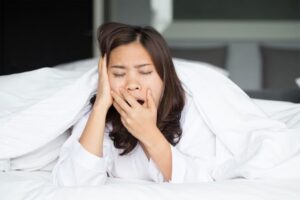Whether you’re a new parent, a shift worker, or have a sleep disorder, you may be wondering how to get through the day without sleep after a bad night. Sleep loss can cause significant impairments to your physical and mental functioning that make it hard to function the next day.
While your responsibilities won’t vanish just because you didn’t sleep, there are steps you can take to help you cope. We cover how you can make the day after sleep loss a little easier through diet, extra precautions, and power naps so that you can function better on no sleep.
Avoid Skipping Meals
Skipping meals can further decrease your energy levels, so be sure to eat at regular times as much as you possibly can. Vitamins and minerals in food are important for thinking and physical functioning. You can reduce feelings of fatigue by eating nutrient-rich foods that contain polyphenols, omega-3 fatty acids, and whole grains. These include:
- Apples
- Berries
- Broccoli
- Plums
- Citrus fruits such as oranges
- Fatty fish such as salmon and tuna
- Whole grains such as quinoa and barley
Sleep deprivation often makes people more likely to overeat and choose sugary or fatty foods that are high in calories. If you didn’t sleep enough—or at all—it’s important to focus on making wise food choices that will give you the balanced energy you need to get through the day.
Sharpen Your Mental Focus
Staying up all night may mean you’re more likely to find yourself struggling to stay focused the next day. Although there is no substitute for adequate sleep, you can take some steps to improve your focus.
- Drink caffeine: Coffee or other caffeinated drinks can temporarily increase your energy and sharpen your mental focus. Be sure to stop drinking caffeine after 2 p.m. to not interfere with your sleep schedule.
- Exercise: Exercising during the day can help you get your sleep cycle back on track. Exercise at least 4 hours before bedtime.
- Get sunlight: Get exposure to natural light for 30 minutes or more, early in the day.
- Stay hydrated: Dehydration can contribute to feelings of fatigue, so it may be helpful to drink fluids like water or electrolyte drinks to ensure your body is properly hydrated.
Hold Off on Big Decisions or Projects
It’s wise to avoid making important decisions or working on major projects when you are sleep-deprived. People suffering from sleep loss tend to be more impulsive, more likely to take risks, and may gather less information prior to making decisions.
A good night’s sleep will likely restore your usual ability to make smart decisions, so wait until you are well-rested before working on projects that require higher levels of concentration or before making a big decision.
Take Extra Safety Precautions If You Must Drive
Avoid driving when tired if possible. Ask a friend for a ride or pay for a taxi, both of which are likely to cost far less than an accident and are much safer for you and others on the road.
Sleep loss slows your response times to levels that are comparable to drunk driving. All kinds of accidents, including car crashes, are more likely when a person is tired. Around 10,000 car crashes and 1,000 deaths each year are attributed to drowsy driving.
If you must drive, be realistic about what is safe. Do not drive for long periods when you are sleep-deprived. Avoid distractions like eating, changing the music, talking on the phone, or texting when driving.
Consider a Power Nap
If you are able to take one, a short nap is likely to make you feel and function better after a sleepless night. A short power nap has been found to both reduce sleepiness and increase alertness.
It is best to keep naps short. The ideal length for napping is between 20 and 30 minutes. Naps longer than 30 minutes can make people feel groggy.
How to Sleep Better
Make restful sleep a priority by practicing good sleep hygiene and establishing a sleep routine to help you wind down. While you can take steps that may help you function better on no sleep, there is no substitute for the mental and physical health benefits of quality sleep.
- Stick to a strict sleep schedule: Go to bed and get up at approximately the same time each day, even on weekends, in order to reset your sleep schedule .
- Create a relaxing sleep environment: Ensure your bedroom is quiet, dark, and slightly cool.
- Exercise: Exercise regularly to help with sleep, but avoid intense exercise at least 4 hours before bedtime
- Avoid substances that interfere with sleep: While alcohol can make some people feel sleepy, it can also interfere with your sleep quality, preventing deep sleep. Also try to avoid caffeine and nicotine in the afternoon and evening as their stimulating effects can keep you awake at night.
- Address sleep disorders: Many sleep disorders can prevent you from getting restful sleep. If you have symptoms of a sleep disorder like insomnia, sleep apnea, or restless legs syndrome, talk to your doctor.
- Try relaxation practices: You may sleep better if you practice relaxation techniques that help you wind down before bed.
References
Ask the Sleep Doctor
Have questions about sleep? Submit them here! We use your questions to help us decide topics for articles, videos, and newsletters. We try to answer as many questions as possible. You can also send us an email. Please note, we cannot provide specific medical advice, and always recommend you contact your doctor for any medical matters.



